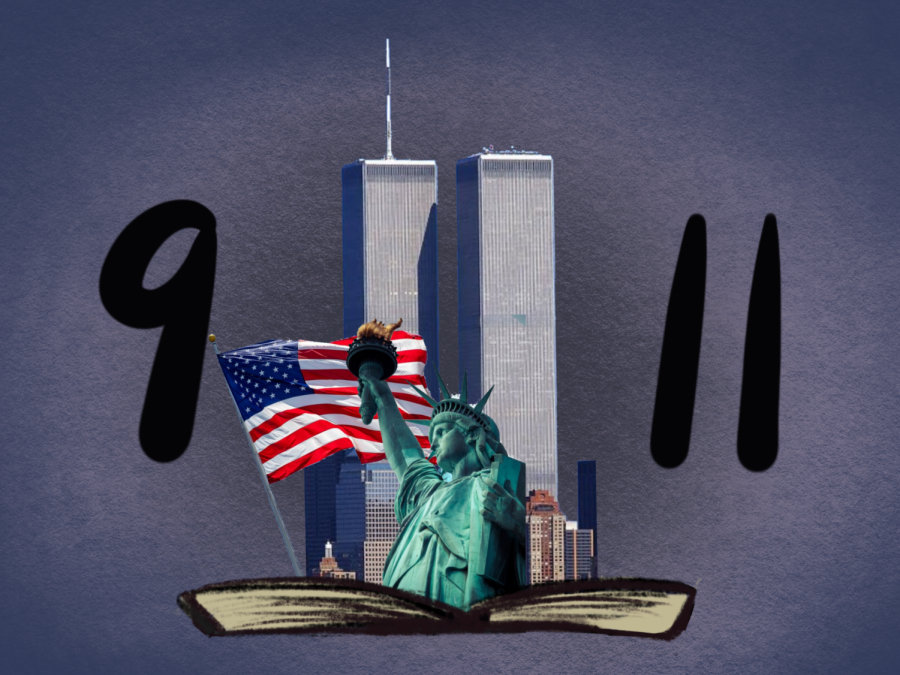9/11: Through the Perspective of a Student in the 21st Century
September 23, 2020
Perhaps one of the most famous historical events in the 21st century was the terrorism of 9/11. If you have been living under a rock for almost two decades, 9/11 was a terrorist attack on New York’s World Trade Center or the ‘Twin Towers.’ As present-day high school students, we did not experience 9/11. We have access to photographs and videos of both before and after the crash. But that is the closest we will ever get to see the chaos. Our parents experienced it, but we did not. Almost as if it were relevant to millions of lives, but not ours, not Gen Z’s. So why should you acknowledge something that has not impacted your life?
Sorrow is easy. At least feeling it is. We feel sorrow for the Holocaust survivors and the ones that did not survive it. And similarly, we experience sorrow when we hear both the stories of people who survived that Tuesday in September and of those who did not. For as long as I can remember, I have been reminded of the terrible actions taken upon the people of New York every 11th of September. I felt like it was something to feel sorrow for, but thought nothing else if it. It was not until freshman year that I realized the true importance of 9/11.
A former teacher of mine assigned a 9/11-themed project for his freshman English course. He made us analyze the plane structure, the specific seats in which the soon-to-be-hijackers sat, and the plane number. I believe that he sought to educate us on something so relevant, something that we did not experience.
So there I was freshman me, sitting at a desk, 20 pages of reports and personal recounts sitting in front of me. I think that was the first assignment that went into the grade book, so I wanted to perform incredibly well. I heavily recall this pain in my chest as I read the accounts of those impacted. It felt surreal. The way that these articles would explain the plan that the hijackers took made it seem fictional, something out of a movie. I pictured myself as one of the passengers, as part of a visiting family taking pictures in front of the towers, as a stressed-out middle-aged man, staring blankly at his computer on the 17th floor of the North Tower. But it also felt like it was a different world. As current high schoolers, we think that the only things that affect our daily lives are things that occur daily, like a new cheesy tweet from a politician. But that is not entirely true.
9/11 led to increased precautions. It led to growing Islamophobia. It led to military campaigns in the Middle East. It even led to ‘random’ flight inspections. 9/11 spared my parents and my older cousins. But it did not spare the people of New York. To this day, millions of 9/11 survivors struggle with their physical health as a result of their presence in New York that Tuesday. From injuries present on that very same day to dormant conditions that are now beginning to take a toll, the people who witnessed the crashes that 11th of September have paid too high a price. It is absurd to ignore its effects.
In no way whatsoever am I trying to say that this dreadful event was positive, but I think that it is important that we recognize that positive reforms took place because of 9/11. For example, more people began to appreciate their family and spent more time with their loved ones. Also, airport reforms, such as scanning and increased security, allowed passengers to feel a bit safer. These effects seem so ‘natural’ to us since they have been practiced longer than we have been alive. But our elders have known that it hasn’t always been like this, and quite frankly, I think all high-school students should be aware that 9/11 has impacted our lives more than we credit it for. That is why 9/11 is so important. That is why our generation and future generations should acknowledge the effects of 9/11. The bottom line is that 9/11 was an impactful event that affected and continues to affect the world, whether we know it or not.

